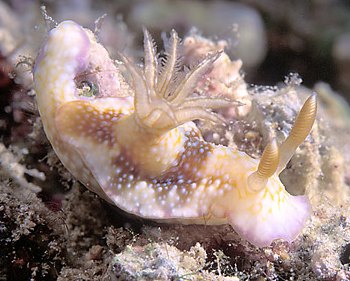
Hypselodoris reidi
Gosliner & Johnson, 1999
Order: NUDIBRANCHIA
Suborder: DORIDINA
Superfamily: EUDORIDOIDEA
Family: Chromodorididae
DISTRIBUTION
Known from Luzon, sthn Philippines, and reported here from nthn Sulawesi, Indonesia.
PHOTO
Anilao, Luzon Island, Philippines. April, 2002. Photo: Jeff Rosenfeld
The mantle is translucent with a reticulate pattern of orange-yellow and slightly raised white spots. Around the raised gill pocket the back ground can be quite dark, in some specimens forming almost black patches in front of and behind the gills. In others the background appears a dull purplish brown. There is a diffuse pale purplish border to both the foot and the mantle. The gills and rhinophore clubs are a translucent straw colour, and the gills are edged in a darker yellow-brown, sometimes with white spots or streaks along the inner edge. The gill pocket is noticeably raised. Grows to approx 50mm long.
References:
• Gosliner, T.M. & Johnson, R.F. (1999) Phylogeny of Hypselodoris (Nudibranchia: Chromodorididae) with a review of the monophyletic clade of Indo-Pacific species, including descriptions of twelve new species. Zoological Journal of the Linnean Society, 125: 1-114.
Rudman, W.B., 2002 (November 20) Hypselodoris reidi Gosliner & Johnson, 1999. [In] Sea Slug Forum. Australian Museum, Sydney. Available from http://www.seaslugforum.net/find/hypsreid
Related messages
Hypselodoris reidi from the Philippines
February 11, 2008
From: Carrie Lo

Dear Bill,
Could this be a Nembrotha lineolata in different colour form?
Locality: Site: Bunga Bend North, 10 M, Southern Leyte, Philippines, 25 December 2007. Length: 1.5 cm. Photographer: Carrie.
Thanks,
Carrie
carrilohc@yahoo.com.hk
Lo, C., 2008 (Feb 11) Hypselodoris reidi from the Philippines. [Message in] Sea Slug Forum. Australian Museum, Sydney. Available from http://www.seaslugforum.net/find/21327Dear Carrie,
It certainly has a similar shape to a nembrothid, but this is one of a group of the genus Hypselodoris with a similar high body profile and narrow mantle margin. It is Hypselodoris reidi.
Best wishes,
Bill Rudman
Re: Hypselodoris reidi not H. krakatoa
April 10, 2006
From: Terry Gosliner
Concerning message #16278:
Hi Bill,
I had a look at all the images under H. reidi and H. krakatoa and they are all correctly nidentified. I think more important than the dark bands, H. krakatoa always has three dark longitudinal lines with a series of opaque white, almost silvery, spots near the lines. It is always more reddish, often with a purple edge to the sides of the foot. H. reidi has much more muted white spots. I am pretty sure they are different. The discussion in our paper also outlines several internal differnces in mantle gland distribution, radular differences and reproductive differences.
Best,
Terry
tgosliner@calacademy.org
Gosliner, T., 2006 (Apr 10) Re: Hypselodoris reidi not H. krakatoa. [Message in] Sea Slug Forum. Australian Museum, Sydney. Available from http://www.seaslugforum.net/find/16286Thanks Terry,
Best wishes,
Bill Rudman
Hypselodoris reidi not H. krakatoa
April 8, 2006
From: Terry Gosliner
Concerning message #16258:
Hi Bill,
Guido Poppe's animal is Hypselodoris reidi not H. krakatoa. Both have the characteristic elevated gills and based on Rebecca's and my phylogeny the two are very closely related.
Best,
Terry.
tgosliner@calacademy.org
Gosliner, T., 2006 (Apr 8) Hypselodoris reidi not H. krakatoa. [Message in] Sea Slug Forum. Australian Museum, Sydney. Available from http://www.seaslugforum.net/find/16278Thanks Terry,
Perhaps I was fooled by my own Fact Sheet. Is the photo there really H. krakatoa or is it H. reidi as well? Looking at all the photos we now have on the Forum of both species, there appears to be a continuum between the H. krakatoa and H. reidi you and Rebecca illustrated in your description, from H. krakatoa-like animals with a brown band down each side of the mantle to H. reidi-like ones in which there are only slight traces of a brown band.
If you could check my identifications of these two species on the Forum I would be grateful. Do you think it's possible they may turn out to be forms of one species? In the meantime I'll swap the Poppe's message over to H. reidi.
Best wishes,
Bill Rudman
Hypselodoris krakatoa - feeding
April 7, 2006
From: Guido & Philippe Poppe

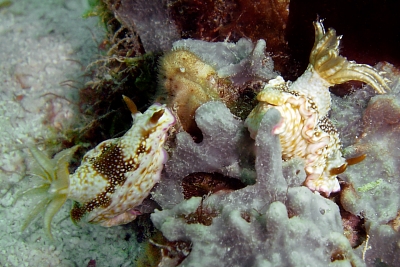
Note added 8 April 2006: See Terry Gosliner's message #16278 suggesting this is H. reidi not H. krakatoa.
Dear Bill
Here are some photos of a species of Hypselodoris you may find interesting from our website on Philippines marine life at
http://www.poppe-images.com/.
Upper & Lower photo: Tubod, Siquijor Prov., Philippines,.25 m. 2005. Middle photo: Caubian Island, Cebu, Philippines. 2003. Photos: Copyright Guido & Philippe Poppe.
Best wishes,
Guido & Philippe Poppe
philippe@conchology.be
Poppe, G. & Poppe, P., 2006 (Apr 7) Hypselodoris krakatoa - feeding. [Message in] Sea Slug Forum. Australian Museum, Sydney. Available from http://www.seaslugforum.net/find/16258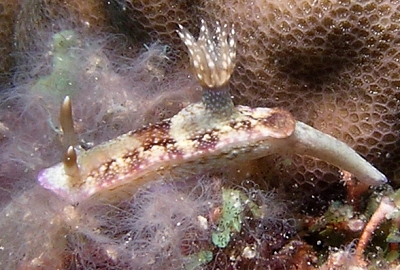
Dear Guido & Philippe,
This is Hypselodoris krakatoa, 'krakatoa' being a very appropriate reference to the volcano-like gills and gill pocket as you can see in the photo alongside. The photos show animals on the same sponge, a species of Euryspongia. The sponge looks quite different in the photos from the different localities because in the upper (and lower) photos the sponge has been almost entirely eaten and only the fibrous 'skeleton' remains, while in the middle photo the two animals have not eaten much of the colony.
This is a valuable adittion to our knowledge as before this we know nothing about the food of H. krakatoa.
Best wishes,
Bill Rudman
Re: Hypselodoris reidi from Indonesia
July 1, 2005
From: Roberto Sozzani
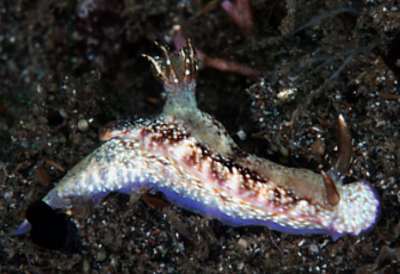
Dear Bill,
Since my last message [#14128] I've found another photo of Hypselodoris reidi, this time from Manado.
Locality: Manado - North Sulawesi, Indonesia. Depth: 10 metres. Length: 6 cm. June 2003. Muddy slope. Photographer: Roberto Sozzani
Best wishes
Roberto Sozzani
www.robertosozzani.it
roberto.sozzani@fastwebnet.it
Sozzani, R., 2005 (Jul 1) Re: Hypselodoris reidi from Indonesia. [Message in] Sea Slug Forum. Australian Museum, Sydney. Available from http://www.seaslugforum.net/find/14144Dear Roberto,
Thanks for this. There is certainly some colour variability in this species and the other one with a volcano-like gill pocket, which is appropriately named H. krakatoa. Perhaps as more material becomes available we will find there are either more than two species or perhaps just one very variable one.
Best wishes,
Bill Rudman
Hypselodoris reidi from Indonesia
June 28, 2005
From: Roberto Sozzani

Dear Bill,
Here is another finding of what I think is an Hypselodoris reidi from Indonesia. This specimen seems to have darker colors than the two already on the forum, even darker than the one from Manado. Photos where shot in Sangeang island, an active volcano with black sand. I hope these photos can be useful for the forum.
Locality: Sangeang Island, Indonesia. Depth: 12 metres, Length: 5 cm. June 2003. Black sand slope. Photographer: Roberto Sozzani
Best wishes,
Roberto Sozzani
www.robertosozzani.it
roberto.sozzani@fastwebnet.it
Sozzani, R., 2005 (Jun 28) Hypselodoris reidi from Indonesia. [Message in] Sea Slug Forum. Australian Museum, Sydney. Available from http://www.seaslugforum.net/find/14128
Dear Roberto,
Thanks for these photos. With its high volcano-like gill pocket, its very appropriate to find it where you did. It's good to get more photos of these recently named species, which we know little about. It helps build up a better picture of their colour variability.
Best wishes,
Bill Rudman
Hypselodoris reidi - feeding observation
November 27, 2002
From: Massimo Boyer

Dear Bill,
Thank you very much for your help. Here is the photo at full resolution. It is not much, because the picture has been taken with a small digital camera. Anyway it seems that it is feeding.
Now I know where to look for the animal, eventually I will send you a better picture when I will be able to locate it again.
Regards
Massimo
massimo@edge-of-reef.net
Boyer, M., 2002 (Nov 27) Hypselodoris reidi - feeding observation. [Message in] Sea Slug Forum. Australian Museum, Sydney. Available from http://www.seaslugforum.net/find/8513Thanks Massimo,
This version of the photo certainly shows the colour pattern more clearly and also shows the oral tube everted onto the sponge, a pretty good indication that it is feeding.
Best wishes,
Bill Rudman
Hypselodoris reidi from Philippines
November 25, 2002
From: Jeff Rosenfeld

Hi Bill,
Here's a shot of Hypselodoris reidi taken in Anilao, Luzon Island, Philippines in April, 2002. I noticed you don't yet have a page for this species.
Thanks,
Jeff
jhrosenfeld@seattleschools.org
Rosenfeld, J., 2002 (Nov 25) Hypselodoris reidi from Philippines. [Message in] Sea Slug Forum. Australian Museum, Sydney. Available from http://www.seaslugforum.net/find/8468Dear Jeff,
Thanks for filling a gap. By coincidence I have just received a message from Massimo Boyer, with a much darker specimen from Sulawesi in Indonesia. Your photo and his show an interesting range in colour.
Best wishes,
Bill Rudman
Hypselodoris reidi from Manado, Indonesia
November 25, 2002
From: Massimo Boyer
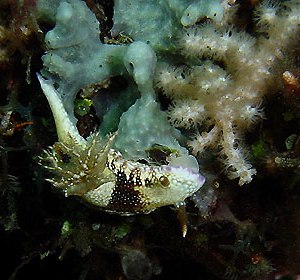
Dear Dr. Rudman,
I am a biologist, and among the others I am developing a new website about sealife in North Sulawesi, Indonesia (with a large part, already developed, on opisthobranchs). If you like to visit it: http://www.edge-of-reef.net
I would like to show you this photo, taken by Paola Bearzi in Manado Bay, 3m depth, on a sandy bottom with scattered rocks. The animal is on an encrusted rock, maybe feeding on a sponge (Ircinia?).
I did not find this species in any books. Can you help me with the identification?
My best regards, and compliments for your work.
Massimo Boyer
massimo@edge-of-reef.net
Boyer, M., 2002 (Nov 25) Hypselodoris reidi from Manado, Indonesia. [Message in] Sea Slug Forum. Australian Museum, Sydney. Available from http://www.seaslugforum.net/find/8471Dear Massimo,
This is Hypselodoris reidi. Thanks for this interesting find, which I think is the first record of the species from outside the Philippines. By chance, Jeff Rosenfeld has just sent a photo of this species, from the type locality, Luzon. As you can see it seems to show some colour variation in the extent and darkness of the patch in front of the gills. Your photo does seem to show the oral tube extended out on to the sponge. If you could send a larger scan so I could see the head and the sponge more clearly I would be grateful as it would make a valuable feeding record.
Good luck with your excellent website
Best wishes,
Bill Rudman
